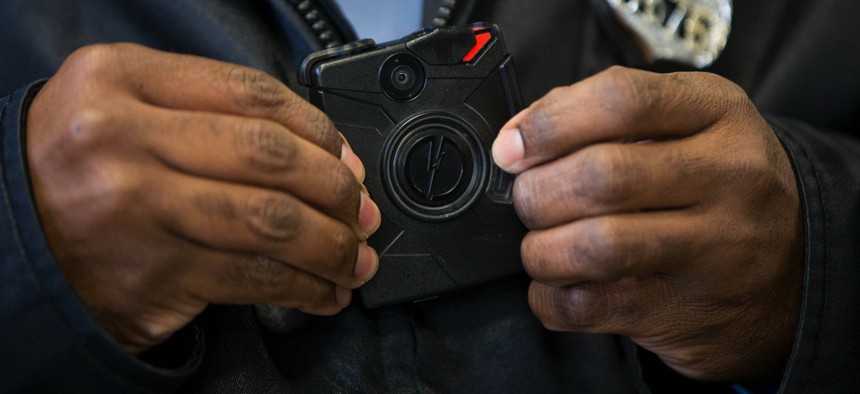What's On Tap for Route Fifty's Webcast on Police Body Camera Programs?

In this Dec. 11, 2014, file photo, a Philadelphia Police officer demonstrates a body-worn camera being used as part of a Philadelphia Police pilot project in the department's 22nd District Matt Rourke / AP File Photo

Connecting state and local government leaders
Register for our upcoming panel discussion: 2 p.m. ET on Wednesday, Feb. 24.
When it comes to the big questions in the world of law enforcement technology, many of those questions cross paths on the topic of body-worn cameras for police officers.
Much of the public debate about body cameras in the United States—prompted by controversial officer-involved shootings in many localities across the nation—has focused on policing methods, law enforcement transparency, accountability and community relations.
But there are also important discussions going on at different levels of government regarding the technical and operational considerations for the implementation of body-worn camera technology in law enforcement agencies and the rules, policies and best practices that shape them.
Police officers and sheriff’s deputies simply can’t flip a switch on a body camera and be done. It’s not that simple.
Beyond questions involving data retention and management—body camera videos require a lot of storage—there are complicated issues involving privacy, video redaction and who has access to the data collected through those cameras and when they are accessible.
We’ve pulled together a great panel of experts for an upcoming special Route Fifty webcast discussion moderated by Executive Editor Michael Grass examining police body-worn camera program implementation. It’s set for Wednesday, Feb. 24 at 2 p.m. ET / 11 a.m. PT and free to watch. (Register here.)
On our panel for the webcast discussion:
- Raymond Gregory, the assistant sheriff in Riverside County, California. The sheriff’s department in Riverside County recently released new policies for the use body-worn cameras.
- Rachel Levinson-Waldman, senior counsel to the Brennan Center for Justice’s Liberty and National Security Program. The Brennan Center, based at the New York University School of Law, has been researching police body camera programs in major U.S. cities.
- Antonia Merzon, a consultant with the Colorado District Attorneys Council who authored a major report on body-worn camera programs for the Colorado Best Practices Committee for Prosecutors. Merzon previously worked in the New York County District Attorney’s office where she worked as an assistant district attorney and was appointed to create and run a special identity theft unit, the first of its kind in the nation.
REGISTER AND TUNE IN ON WEDNESDAY, 2 P.M. ET / 11 A.M. PT.
Webcast viewers are encouraged to submit questions. Route Fifty (@statelocal) will be livetweeting the webcast using #R50policetech.
PREVIOUSLY on Route Fifty:

NEXT STORY: How Govinfo keeps pace with users




